 Cleanzine: your weekly cleaning and hygiene industry newsletter 26th June 2025 Issue no. 1168
Cleanzine: your weekly cleaning and hygiene industry newsletter 26th June 2025 Issue no. 1168
Your industry news - first
The original and best - for over 20 years!
We strongly recommend viewing Cleanzine full size in your web browser. Click our masthead above to visit our website version.
Recycle Week beach litter research reveals recycling on the go has room for improvement
 Cromwell Polythene has undertaken a beach cleaning and litter surveying programme to mark Recycle Week (25 September - 1 October) and encourage maximum levels of recycling. Results indicate recycling on the go needs improvement.
Cromwell Polythene has undertaken a beach cleaning and litter surveying programme to mark Recycle Week (25 September - 1 October) and encourage maximum levels of recycling. Results indicate recycling on the go needs improvement.
'Recycling - It's Worth It!' is the message that was shared for Recycle Week, so a team of 24 volunteers from Cromwell Polythene, took to their local beach at Filey on the North Yorkshire coast to measure the impact of waste and champion community recycling best practice.
As well as being a waste of precious resources that could be reused or recycled, beach litter is a threat to marine wildlife, tourism and the fishing industry.
The team, which supplies polythene products to aid recycling, worked alongside organisers, the Marine Conservation Society and volunteers from the Yorkshire Wildlife Trust's Living Seas Centre, to pick and mark collections of litter found on the beach.
Unfortunately, the variety and condition of litter collected meant that it was not viable to recycle (too dirty or degraded). In most cases, with hard plastics, the items could have been recycled if they had been placed for recycling immediately after use.
Results from Cromwell Polythene's Recycle Week collection, conducted over a 100 metre radius of the beach showed the following levels of rubbish:
- 243 plastic/polythene items including bottles, caps, cups, packets and party poppers. The majority of items were fragments of larger pieces. Only one plastic bag was recovered.
- 19 rubber items including bits of balloon, pieces of dog balls and part of a flip flop
- 4 cloth items including sacking, shoe lace and knickers
- 44 paper and cardboard items including cartons, cigarette packets and cups
- 24 wood items including cork, lolly sticks and chip forks
- 14 metal items including cans, caps and foil wrappers
- 20 glass items all from glass bottles
- 6 items of pottery
- 8 sanitary items including wet wipes, flossers and plasters
- And last but not least... 4 bagged dog faeces
This is just the tip of the iceberg, with annual figures indicating there are nearly 2,500 items of rubbish for every kilometre on a beach. This litter comes from many sources - the public, fishing activities, sewage pipes and shipping, but it is all preventable.
"Our beach clean to mark Recycle Week revealed all manner of rubbish including wet wipes, metals, plastics and piping
"As our passion for plastic has increased, so too have environmental concerns connected with its production, distribution and disposal. However, the real issue is not with plastics themselves, but littering itself, which is a social behaviour problem.
"The convenience, robustness, and lightweight characteristics, and economic processing cost of plastic, along with ease of product design, means that plastic products have become part of modern life styles, but that does not mean that they should be less valued and discarded any more than other items. Measures like the expansion of recycling initiatives in public spaces will help more people to be able to recycle on the go."
www.wrap.org.uk / www.mcsuk.org
5th October 2017







